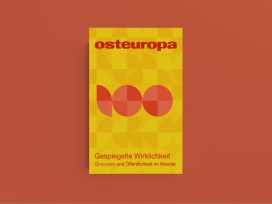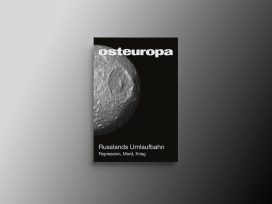The Yukos case
The trial in Moscow of Mikhail Khodorkovsky and Platon Lebedev came to an end on 31 May 2005, when the accused were found guilty and sentenced. But the case as a whole is not over, for the trial bore no resemblance to the settlement in court of a legal dispute. If justice had been done, the appropriate thing to do now would be to recognize that the legal system had performed its functions and to move on to the next item on the agenda. However, the painstaking reconstruction and detailed legal assessment of the charges, the trial itself, and the verdict which Otto Luchterhandt undertakes in this issue lead to an unambiguous conclusion: the trial was a legal scandal. The State Prosecutor’s Office and the courts acted as henchmen of the presidential administration, and fabricated a case. In the course of these criminal proceedings, fundamental legal principles were systematically and cynically violated. The Yukos case has implications for the whole of Russia. It is therefore necessary to look behind the scenes in the Meshchansky District Court and to illuminate the dark corners and political interests we find there.
The case has revealed the state of democracy in contemporary Russia. The system of “guided democracy”, which Putin has made acceptable, is now so far advanced that nothing remains of it apart from the steering mechanism. Lev Gudkov and Boris Dubin examine the public reaction to Khodorkovsky’s arrest, the campaign in the mass media, and the trial itself, and show that the proceedings fit seamlessly into the authoritarian subjugation of politics, the economy, and society being pursued by Putin and his secret service entourage. State power is able to rely on the support of the broad, uninformed mass of the population. At the same time, state power sends out symbolic messages designed to deter, intimidate, and repress. That was the true function of the Khodorkovsky trial and of all the symbolic trials that have taken place in the last few years – of environmental activists, scientists, and artists, of people like Nikitin, Pash’ko, Sutyagin, and the employees of the Sakharov Museum.
This system of channels needs a visual language that is clear and manipulative, has the capacity to appeal to the public, and is above all well suited to television. This has to be carefully staged, which explains the way in which Khodorkovsky was arrested by members of the Al’fa anti-terrorist unit wearing intimidating military masks, and also the image that was transmitted round the world: the accused inside a cage. This cage was loaded with significance. It represents symbolic violence. There is a crude semiotics at work here, suggesting a struggle with a wild beast. This beast’s wildness is tamed, and its will is destroyed. The bars of the cage protect the people outside from the ever-present threat posed by the beast. This is the immediate and apparent logic of this image, with all the inhumanity it implies. But a difference emerges when we consider the significance of the case for Russia as a whole: those who need to be tamed are all the observers who, at present, think they are outside the cage. In the end everyone will be sitting in the cage, even if some of them find it comfortable or even gilded.
Manfred Sapper, Volker Weichsel
Articles:
Otto Luchterhandt
Legal nihilism in action (de)
The Yukos-Khodorkovsky trial in Moscow
A step-by-step account of the legal “farce” that led up to the conviction of Mikhail Khodorkovsky, in which all principles of a fair trial were violated. [2005-08-11]
Boris Dubin, Lev Gudkov
The oligarch as public enemy (de) (ru)
How the Khodorkovsky case benefits the Putin regime
Cynicism, argue Gudkov and Dubin, is eroding the foundations of the Putin regime and destabilizing its system of controlled democracy. [2005-08-11]
Related articles in Eurozine:
Anthony Robinson
The Yukos affair (en) (de)
The re-nationalization of the Russian oil industry after the arrest of Mikhail Khodorkovsky does not bode well for western Europe. [2005-06-16]
Nina Baschkatow
Putin, Yukos and the elections in Russia (de)
Patriots and oligarchs
What is behind the international outrage over the Yukos affair? [2003-12-17]
Published 29 August 2005
Original in German
First published by Osteuropa 7/2005
Contributed by Osteuropa © Osteuropa Eurozine
PDF/PRINTNewsletter
Subscribe to know what’s worth thinking about.



